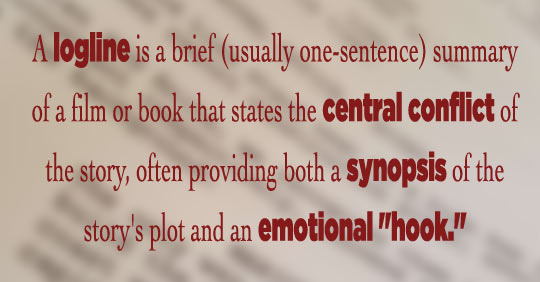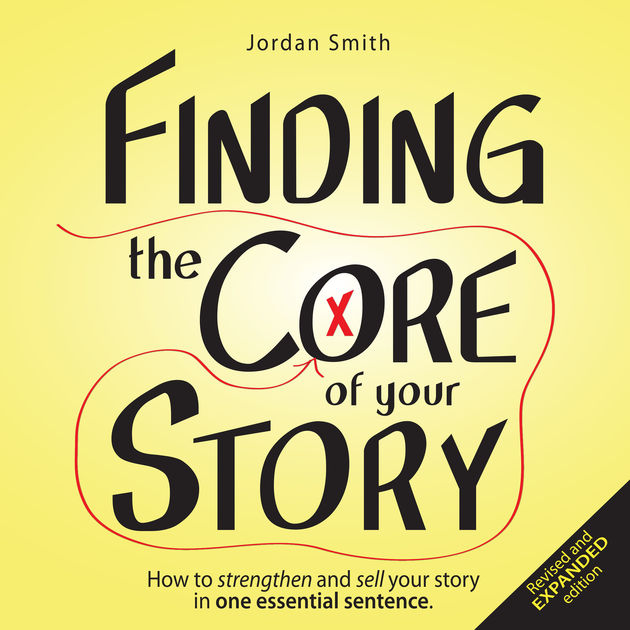
How to write a story logline without going crazy
I decided to try to write a logline for my next novel because I had wandered into mucky territory in working on my plot. I’ve attempted this for several of my earlier novels, but never successfully. I can write a 500-page novel, but a one-sentence summary? This turns my brain into a pretzel.
What is a logline?

The term logline originated in Hollywood. According to some, film producers would get so many scripts to consider that they took to summarizing the story in one sentence and putting it on the spine of the manuscript so that they could easily find what they were looking for.
A more likely explanation, IMO, is this one, thanks to Ms. Google:
The term “logline” was first used in old Hollywood. The big studios would own hundreds of scripts, and the studio head would keep a log book that recorded concise summaries (or “loglines“) that described each script in the studio’s possession.
A logline (sometimes called the “elevator pitch”) summarizes the essence of a story in one sentence (sometimes two) between 20 – 30 words long.
How hard can that be?
Hard!
Why write a logline?
- Writing a logline is a good way of discovering the core of your story.
- A logline will help you keep focussed on that core while writing the novel.
- A logline will be useful if pitching your book to an agent or publisher, should you need to do so.
- A logline will be useful in marketing the novel once it’s published.
How to begin
I love anything that makes writing something seem easy, like this video on writing a logline:
According to this, a logline formula is, simply:
Character + want + obstacle
Easy, right?
Not exactly!
First step: Describe the main character
I’ve read that it’s best to use an (interesting) adjective + noun structure for any character mentioned in your logline, and to not use their names. (An exception to this last is to name characters of historical significance.)
Here’s Molly, the main character of The Next Novel (working title Raptor Girl):
A feral teen falconer with mysterious powers
Yes, I know: it doesn’t quite fit the two-word rule, but I’m going with it.
Her antagonist, young Master Pete, might be described as:
- a predator
- (or, simply) the Master
And the interesting adjective? Here are some I’m considering:
- vindictive
- vengeful
- desperate
Although “desperate predator” is interesting, “vindictive Master” is clearer.
Next step: What does my protagonist want?
That’s the million-dollar-question, because my Molly (or any character, for that matter) wants many things:
- She wants her father’s respect.
- She wants him to come out of his depression, get over his grief.
- She wants to save his life.
- She wants to solve the mystery of her brothers’ death.
- She wants to help her father fulfill her dead brothers’ last wish to compete in Queen Elizabeth’s White Falcon Gala.
- She wants to escape Pete’s murderous vengeance.
- She wants to save the lives of her raptors.
- She wants not to be sent to the gallows for having saved them.
- She wants to be a falconer, to live a life with raptors.
- She wants to kiss the funny horse whisperer.
- She wants to prove to the world that her white falcon is exceptional.
So: how to choose just one?
I began by looking for the one thing that might tie into several others.
This one might be key:
She wants to help her father fulfill her dead brothers’ last wish to compete in Queen Elizabeth’s White Falcon Gala.
Let’s give it the “why” test: Why does she want to do this?
Because:
- It would help restore her father’s spirits.
- It would honour her dead brothers.
- It would prove how amazing her falcon is. (And what an amazing falconer she is, in turn, earning her father’s respect.)
So it’s a fairly central goal, except for one thing. Competing in Queen Elizabeth’s Gala could mean discovery by the Master, from whom she is fleeing.
Last step: the obstacle
So maybe this is the obstacle:
A feral teen falconer with unusual powers is intent on helping her father honour her dead brothers’ last wish by competing in Queen Elizabeth’s White Falcon Gala, although doing so could mean being sent to the gallows by the vindictive Master.
OK. Not bad, although at 41 words it’s far too long. Trimming it back will have to come. Loglines will change over time; they do not have to be written in stone.
Refining the logline
But now, how to refine it, make it better?
In Finding the Core of Your Story Jordan Smith suggests two things:
- some loglines need a phrase to set the scene;
- using the word must or forced can add urgency.
So, giving this a try:
After the suspicious deaths of her two brothers, a feral teen falconer with unusual powers must help her broken-hearted father honour her dead brothers’ last wish by competing in Queen Elizabeth’s White Falcon Gala, although doing so could mean being sent to the gallows by their vindictive Master.
Now to test it, to see if it follows the formula
Main character:
After the suspicious deaths of her two brothers, a feral teen falconer with unusual powers must help her broken-hearted father honour her dead brothers’ last wish by competing in Queen Elisabeth’s White Falcon Gala, although doing will likely mean being sent to the gallows by their vindictive Master.
Goal:
After the suspicious deaths of her two brothers, a feral teen falconer with unusual powers must help her broken-hearted father honour her dead brothers’ last wish by competing in Queen Elizabeth’s White Falcon Gala, although doing so will likely mean being sent to the gallows by their vindictive Master.
Obstacle:
After the suspicious deaths of her two brothers, a feral teen falconer with unusual powers must help her broken-hearted father honour her dead brothers’ last wish by competing in Queen Elizabeth’s White Falcon Gala, although doing so will likely mean being sent to the gallows by their vindictive Master.
The interesting thing about this exercise is that it solved a few plot problems. Before, competing in the Gala was something that happened almost by chance, which didn’t feel logical, much less dramatic. Also, the danger of discovery by Master Pete was never even considered. Now that possibility adds tension.
Plot problems outstanding
There are many outstanding plot problems to be solved, including solving the mystery of her brothers’ death and how to dispense with the vengeful Master.
Also, perhaps the one hook that’s most of interest to potential readers is that Molly will become Queen Elizabeth’s Master Falconer.
You can see how challenging it is to write a logline!
Useful references on writing loglines

Finding the Core of your Story by Jordan Smith
Learn How to Write a Logline for Your Screenplay Once & for All

I’m a big fan of Save the Cat by Blake Snyder, and I’m looking forward to reading Save the Cat Strikes Back, which I understand has a chapter on loglines.
Speaking of Save the Cat, this post on logline templates for specific genres as defined by Snyder looks interesting. I’ll be exploring it soon.
In other words, more to come.

